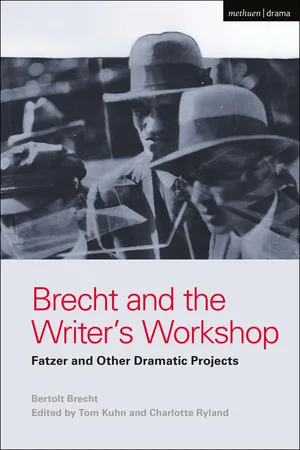
Brecht and the Writer's Workshop
Fatzer and Other Dramatic Projects
Bertolt Brecht, Tom Kuhn, Charlotte Ryland, Tom Kuhn
- 400 pagine
- English
- ePUB (disponibile sull'app)
- Disponibile su iOS e Android
Brecht and the Writer's Workshop
Fatzer and Other Dramatic Projects
Bertolt Brecht, Tom Kuhn, Charlotte Ryland, Tom Kuhn
Informazioni sul libro
Brecht was never inclined to see any of his plays as completely finished, and this volume collects some of the most important theatrical projects and fragments that were always to remain 'works in progress'. Offering an invaluable insight into the writer's working methods and practices, the collection features the famous Fatzer as well as The Bread Store and Judith of Shimoda, along with other texts that have never before been available in English. Alongside the familiar, 'completed' plays, Brecht worked on many ideas and plans which he never managed to work up even once for print or stage. In pieces like Fleischhacker, Garbe / Büsching and Jacob Trotalong we see how such projects were abandoned or interrupted or became proving grounds for ideas and techniques. The works collated here span over thirty years and allow the reader to follow Brecht's creative process as he constantly revised his work to engage with new contexts. This treasure-trove of new discoveries is also annotated with dramaturgical notes to present readable and useable texts for the theatre. The volume is edited by Tom Kuhn and Charlotte Ryland, with the translation and dramaturgical edition of each play provided by a team of experienced writers, scholars and translators.
Domande frequenti
Informazioni
Tom Kuhn